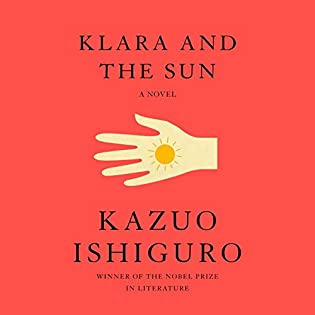 Klara and the Sun by Kazuo Ishiguro, Sura Siu
Klara and the Sun by Kazuo Ishiguro, Sura Siu Published by Random House Audio on March 2, 2021
Length: 10 hours 16 minutes
Format: Audio, Audiobook
Source: Audible
Buy on Amazon, Buy on Bookshop
This post contains affiliate links you can use to purchase the book. If you buy the book using that link, I will receive a small commission from the sale.
Goodreads
'KLARA AND THE SUN' IS A MAGNIFICENT NEW NOVEL FROM THE NOBEL LAUREATE KAZUO ISHIGURO - AUTHOR OF 'NEVER LET ME GO' AND THE BOOKER PRIZE-WINNING 'THE REMAINS OF THE DAY.'
'KLARA AND THE SUN,' the first novel by Kazuo Ishiguro since he was awarded the Nobel Prize in Literature, tells the story of Klara, an Artificial Friend with outstanding observational qualities, who from her place in the store, watches carefully the behavior of those who come to browse, and of those who pass on the street outside. She remains hopeful that a customer will soon choose her.
'KLARA AND THE SUN' is a thrilling book that offers a look at our changing world through the eyes of an unforgettable narrator, and one that explores the fundamental question: What does it mean to love?
In its award citation in 2017, the Nobel committee described Ishiguro's books as "novels of great emotional force" and said he has "uncovered the abyss of our illusory sense of connection with the world."
Kazuo Ishiguro seems to me, more than any other author living, to be writing to explore what it means to be human. Where does our humanity reside? How do we remember? How are we remembered? Or, as Josie’s father asks Klara in one of the most profoundly moving parts of the book, “Do you believe in the human heart? I don’t mean simply the organ. I’m speaking in the poetic sense. The human heart. Do you believe there is such a thing?” That passage was the first part of the book to cause me to burst into tears—it was not the last—and as I explained to my husband, it reminded me of this essay, “Joyas Voladores” by Brian Doyle, adding more dimension to the essay (which, honestly, didn’t make me cry the first time I read it but now makes me cry because I associate it with this passage). Ron Charles argues in his review of Klara and the Sun that ” the real subject, as always in Ishiguro’s dusk-lit fiction, is the moral quandary of the human heart.”
I have yet to finish an Ishiguro novel without bawling, and this book was no exception. As with his other novels, in Klara and the Sun, Ishiguro’s narrator has a compelling voice. Her childlike propensity to hope, her belief in the healing power of the sun, is simply heartbreaking. It’s hard not to draw parallels to both The Remains of the Day and Never Let Me Go, and both of those novels also have memorable narrators who struggle to make sense of the mysteries of the human heart as well. There is something different in Klara’s struggle to please, to understand. She has the lack of agency of Kathy in Never Let Me Go and the outsider observational perspective of Stevens in The Remains of the Day, but she’s somehow more innocent. The ending of the book just wrecked me.
This book is one of the best I read this year. It has me thinking about what it means to be human and how much of our humanity we have lost over the last several years. Prepare the tissues if you read it. I couldn’t recommend it more highly. Superb.